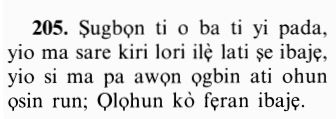2vs205
Select any filter and click on Go! to see results
وَإِذَا تَوَلَّى سَعَى فِي الأَرْضِ لِيُفْسِدَ فِيِهَا وَيُهْلِكَ الْحَرْثَ وَالنَّسْلَ وَاللّهُ لاَ يُحِبُّ الفَسَادَ
Waitha tawalla saAAa fee alardi liyufsida feeha wayuhlika alhartha waalnnasla waAllahu la yuhibbu alfasada
Index Terms
Click to play
Yoruba Translation

Hausa Translation
Kuma idan ya jũya sai ya yi gaggawa a cikin ƙasa dõmin ya yi ɓarna a cikinta, kuma ya halaka shũka da ´ya´yan dabbõbi. Kuma Allah bã Ya son ɓarna.
Asbabu n-Nuzuul (Occasions of Revelation)
.وَإِذَا تَوَلَّى سَعَى فِي الأَرْضِ لِيُفْسِدَ فِيِهَا وَيُهْلِكَ الْحَرْثَ وَالنَّسْلَ ...
And when he turns away (from you O Muhammad), he struggles in the land to make mischief therein and to destroy the crops and the cattle,
This Ayah indicates that such persons are deviant in the tongue, evil in the deeds, their words are fabricated, their belief is wicked and their works are immoral. The Ayah used the (Arabic word) Sa`a (literally, `tries' or `intends').
This word was also used to describe Pharaoh:
ثُمَّ أَدْبَرَ يَسْعَى
فَحَشَرَ فَنَادَى
فَقَالَ أَنَاْ رَبُّكُمُ الاٌّعْلَى
فَأَخَذَهُ اللَّهُ نَكَالَ الاٌّخِرَةِ وَالاٍّوْلَى
إِنَّ فِى ذَلِكَ لَعِبْرَةً لِّمَن يَخْشَى
Then he turned his back, Yas`a (striving hard against Allah). Then he gathered (his people) and cried aloud saying, `I am your lord, most high.' So Allah, seized him with a punishing example for his last and first transgression. Verily, in this is an instructive admonition for whosoever fears Allah. (79:22-26)
Sa`a was also used in the Ayah):
يأَيُّهَا الَّذِينَ ءَامَنُواْ إِذَا نُودِىَ لِلصَّلَوةِ مِن يَوْمِ الْجُمُعَةِ فَاسْعَوْاْ إِلَى ذِكْرِ اللَّهِ
O you who believe (Muslims)! When the call is proclaimed for the Salah (prayer) on the day of Friday (Jumuah prayer), As`aw come to the remembrance of Allah. (62:9)
This Ayah means, `(when the call to the Friday prayer is announced) intend and then proceed to attend the Friday prayer.' We should mention that hastening to the mosque is condemned by the Sunnah (as this is another meaning for the word Sa`a):
إذَا أَتَيْتُمُ الصَّلَاةَ فَلَا تَأْتُوهَا وَأَنْتُمْ تَسْعَوْنَ، وَأْتُوهَا وَعَلَيْكُمُ السَّكِينَةُ والْوَقَار
When you come to attend the prayer, do not come in a Sa`i (haste). Rather, come to it while walking at ease and in peace (or grace).
The hypocrite has no motive in this life but to cause mischief and to destroy the crops and the offspring, including what the animals produce and what the people depend on for their livelihood.
Mujahid said,
"If the hypocrite strives for mischief in the land, Allah prevents the rain from falling and thus the crops and the offspring perish.''
The Ayah continues:
...وَاللّهُ لاَ يُحِبُّ الفَسَادَ ﴿٢٠٥﴾
...and Allah likes not mischief.
that is, Allah does not like those who possess these characteristics, or those who act like this.
وقوله" وإذا تولى سعى في الأرض ليفسد فيها ويهلك الحرث والنسل والله لا يحب الفساد " أي هو أعوج المقال سيئ الفعال فذلك قوله وهذا فعله كلامه كذب واعتقاده فاسد وأفعاله قبيحة والسعي هاهنا هو القصد كما قال إخبارا عن فرعون " ثم أدبر يسعى فحشر فنادى فقال أنا ربكم الأعلى فأخذه الله نكال الآخرة والأولى إن في ذلك لعبرة لمن يخشى " وقال تعالى " يا أيها الذين آمنوا إذا نودي للصلاة من يوم الجمعة فاسعوا إلى ذكر الله " أي اقصدوا واعمدوا ناوين بذلك صلاة الجمعة فإن السعي الحسي إلى الصلاة منهي عنه بالسنة النبوية " إذا أتيتم الصلاة فلا تأتوها وأنتم تسعون وأتوها وعليكم السكينة والوقار " فهذا المنافق ليس له همة إلا الفساد في الأرض وإهلاك الحرث وهو محل نماء الزروع والثمار والنسل وهو نتاج الحيوانات الذين لا قوام للناس إلا بهما. وقال مجاهد إذا سعى في الأرض إفسادا منع الله القطر فهلك الحرث والنسل " والله لا يحب الفساد" أي لا يحب من هذه صفته ولا من يصدر منه ذلك.
"وإذا تولى" انصرف عنك "سعى" مشى "في الأرض ليفسد فيها ويهلك الحرث والنسل" من جملة الفساد "والله لا يحب الفساد" أي لا يرضى به
قيل : " تولى وسعى " من فعل القلب , فيجيء " تولى " بمعنى ضل وغضب وأنف في نفسه . و " سعى " أي سعى بحيلته وإرادته الدوائر على الإسلام وأهله , عن ابن جريج وغيره . وقيل : هما فعل الشخص , فيجيء " تولى " بمعنى أدبر وذهب عنك يا محمد . و " سعى " أي بقدميه فقطع الطريق وأفسدها , عن ابن عباس وغيره . وكلا السعيين فساد . يقال : سعى الرجل يسعى سعيا , أي عدا , وكذلك إذا عمل وكسب . وفلان يسعى على عياله أي يعمل في نفعهم .
I'raab - grammatical analysis of the Qur'an
«وَإِذا» الواو عاطفة إذا ظرف لما يستقبل من الزمن متعلق بيشهد.
«تَوَلَّى» فعل ماض والفاعل هو والجملة جواب شرط غير جازم لا محل لها.
«سَعى » ماض فاعله مستتر.
«فِي الْأَرْضِ» متعلقان بسعى.
«لِيُفْسِدَ» اللام لام التعليل يفسد فعل مضارع منصوب بأن المضمرة بعد لام التعليل والفاعل هو يعود إلى من ، وأن والفعل في تأويل مصدر في محل جر بحرف الجر والجار والمجرور متعلقان بيسعى.
«فِيها» متعلقان بيفسد «وَيُهْلِكَ» الواو عاطفة يهلك فعل مضارع.
«الْحَرْثَ» مفعوله.
«وَالنَّسْلَ» عطف والجملة معطوفة.
«وَاللَّهُ» الواو استئنافية اللّه لفظ الجلالة مبتدأ وجملة «لا يُحِبُّ الْفَسادَ» خبره والجملة الاسمية واللّه استئنافية.
